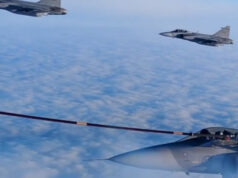As reported by local outlet Bild, the German Army is currently facing severe available issues with its helicopter fleet.
The German Army only had 8 available Tiger attack helicopters (out of a total of 53) and only 12 ready-to-use NH90 transport helicopters (out of 99) available in November, according to local media.
“The catastrophic operational readiness of the tiger now also affects the training of the pilots. This state of affairs is irresponsible,” Tobias Lindner told BILD here.
Availability issues have been impacting the operational effectiveness of the German military for some time now. Last year, we reported that less than a third of German military assets were operational.
The 2018 ‘Report on the Operational Readiness of the Bundeswehr Primary Weapons Systems’ was presented to Germany’s lower house of parliament with the following headline availability figures.
- Typhoon jets: 39 of 128
- Tornado jets: 26 of 93
- CH-53 transport helicopters: 16 of 72
- NH-90 transport helicopters: 13 of 58
- Tiger attack helicopters: 12 of 62
- A400M transport aircraft: 3 of 15
- Leopard 2 tanks: 105 of 224
- Frigates: 5 of 13
- Submarines: 0 out of 6
According to local media, the German Defence Ministry said that a higher number of training missions and deployments since Russia’s intervention in eastern Ukraine in 2014 had caused existing equipment to wear down quicker than it had previously.
“It’s a real disaster for the Navy, it’s the first time in history that there will not be any submarine operating for months,” warned the president of the Foreign Affairs Committee of the German Parliament, Hans-Peter Bartels, in an interview published at the time.














So what I took from the German Defence ministry statement is “we used them and they broke”
Meanwhile, the Poles have taken up the role of defensive shield for NATO and are pouring resources into their military. I believe they’re shooting for 2000 tanks – many of them ex Bundeswehr Leopard IIs and IIIs (they should be buying M1s or Challengers considering the problems the Turks have been having with survivability of their Leopold fleet in Syria). They very clearly understand the lessons of the past…
Cheers
Sigh, the problems the Turks have been experiencing with the Survivability of their tanks of any kind has not been the vehicle per say but how they have been used.
Sitting a tank on top of a hill and using it like a pillbox without any infantry support is a good way to get it destroyed. Also deploying their Leo-2 with mainly APFSDS rounds when they are being used for COIN is hardly a brilliant idea.
The purge of the Turkish Officer corp and replacement with those who are Erdogan loyalists first has had dire consequences for the combat ability of their armed forces.
Fedaykin-“Sigh, the problems the Turks have been experiencing with the Survivability of their tanks of any kind has not been the vehicle per say but how they have been used”
+1 That. Some of the vids coming out of the area are showing basic tactical errors, yes its easy to spot errors without having the full picture or not being there but a tank fully exposed on a hill would result in the troop sergeant driving over for a “face to face” (not allowed to swear on the net) to educate said commander in fire position selection.
Keeping on the subject of Turkey, has anyone noticed the huge amount of propaganda coming out of the country about defence technology? I’m seeing daily updates of new MBTs, stealth cruse missiles ect.
BV
Interesting piece…
https://warisboring.com/germanys-leopard-2-tank-was-considered-one-of-the-best-until-it-went-to-syria/
Cheers!
It’s an issue with most conventional tanks as they were not designed to the modern warfare environment. Also these Leopards lack the recent upgrades with which similar tanks faired much better in Afghanistan under similar circumstances.
The article highlights the mistakes the Turkish operators have made the way they have been using their tanks.
It’s safe to say that the upgraded and better protected and appropriately utilised Leopard 2s are still among the bests.
Poles would male a good partner to codevelop some of our land capabilities with by the sound of things.
And to think the person who engineered this debarkle is now the leader of the EU.
Good point Farouk. Bodes well for the EU doesn’t it?
To think that once Germany used to be considered a reliable and powerful NATO partner, now even Canada can deploy more combat power than Germany. I have checked this fact and the Canadians do have more combat ready military units, but stretched across huge home landmass and Pacific as well as Atlantic coastlines.
No excuse for Germany’s poor military performance other than excessive harvesting of the “peace dividend “
It’s piss poor beyond any measurable datum point!
It’s time for a good shaking up of NATO, I would suggest that 2% GDP is the minimum paid on defence to be a member state, coupled with the ability (and will) to deploy combat assets out of area, in support of NATO obligations and extended allied stability deployments, such as the French Mali operations.
Germany is providing to be a total liability to NATO, perhaps it’s time to deliver an ultimatum to the German government.
Also, it represents a very poor return for the German tax payer, with equipment procurement based on German industrial work share, with little interest in maintaining and supporting once procured.
It must be miserable in the German Armed forces too, poorly resourced with zero chance of ever deploying in any meaningful way.
I’m also amazed the Germans mange to be able to sell so much equipment to other countries seeing most of it never get used in anger.
It does get used in anger, just not by Germany…
I think thats why they sell so many, most of the Leopard 2’s they sold where German surplus to requirement and barely used.
2% is not enough look at the state of all the countries other than USA none of them have anywhere near full spectrum capabilities.
It is easy to point the finger elsewhere, but the UK has little in the way of assets to defend it’s airspace, it’s coast or land if invaded. Technology is so advanced now it doesn’t pop up overnight.
How many ships do we have available?
If you re-ran ww2 but with the Russian’s it could be over in weeks the channel virtually no defence now with the range of artillery helicopters etc.
Now all this is obviously worst case scenario and hopefully very unlikely but it would at least be prudent to have some capabilities to build upon rather than start from scratch is Sky Sabre in limited numbers enough for air defence of the UK with the smallest size RAF ever?
Equally considering the proximity of the threat you would hope Germany would have more than a few hundred tanks.
It won’t happen but 2% has to be recognised as insufficient & we should at least be matching the US on GDP considering they have actually very little in the way of threats on the doorstep! 2% should be minimum i.e. in times of economic hardship.
You get no argument from me Simon, 2% is really not good enough (note I did say the absolute minimum though), 3% is about right I think for a broad range of capabilities in sufficient numbers for the task, providing the money is spent wisely and not just gifted to BAE Systems shareholders…
the reason why our 2% is not enough,a chunk of it is used to pay out,compensation,war pension and other benefits,instead of it coming out of the dwp then you have a bigger chunk taken out by our nuclear deterrent which never used to be part of the defense budget,until that fanny Osbourne turned up..our military is a complete joke when you look at the whole picture,for years it has been cut to the bone as a bag up piggy bank for useless politicians who brains are non existent other than to kiss the rear ends of other countries who hate us,have one or 2 companies more or less hold us over a barrel when it comes to equipment,meanwhile enemies having been arming themselves stupid,to a point we can never catch up,even if we upped our defense gdp to %10
I agree Andy, 3% GDP on defence, allocated and ringfenced, is a sensible and sustainable figure.
We need a proper SDSR, not an excuse to cut funding, this needs to match funding to forecast operational requirements for the next 10 years.
3% GDP would inject 12 plus billion a year into defence, allowing for planned and sustainable growth of the armed forces, along with better working and living conditions and better wages and bonuses for our armed forces.
We need to make that money go ‘much further’ than it does now, not just give it to BAE Systems and Augusta to piss against the wall at tax payers expense!
Costly mistakes like Nimrod MR4a Wildcat and the L85 series of small arms (Astute SSN too), must never be allowed to happen again.
Such poorly thought out programs drain what little money we have away from the front line, while corporate fat cats (and retired top brass and politians) and their share holders prosper….
That means root and branch reform of MOD procurement and the whole of the civil service for that matter…
The tail has to stop wagging the bloody dog!
You’re right defences wise, but remember Russia isn’t exactly awash with decent amphibious capabilities. Most of what they have is out of date and would require a significant escort fleet, the build up of which would be blatantly obvious months in advance. Any theoretical aggression would come via land across and through European and NATO allies or solely via air.
There aren’t any cuts coming from Cummmings, with the exception of the large bureaucracy at Whitehall which includes the MOD. A lot of mandarins looking to just string things out to their fat pension or a well paid consultancy role in the defence industry are in for a nasty shock.
Has it occured to you that perhaps the bureaucracy is there for a reason, and that cutting it might turn into a really big issue?
Not saying that bureaucracy should be big or just allowed to expand without hindrence… But an aweful lot of work is done on a daily basic (work that is absolutely crucial) by clerks and the like.
Bureaucracy is a necessity, but unfortunately like most organisations is prone to bloat through the empire building of middle management seeking to maintain and enhance their importance. Unfortunately the public sector doesn’t compete in an open market which is what helps prevent this bloat in private industry.
From those I know that have worked in Whitehall and the Cabinet Office, there are gross inefficiencies due to bloat, lack of modern technology, poor management, and general spendthrift. When departmental cuts have been made in the past, it’s generally front line staff outside of the Whitehall machine that do the daily basic work that you refer to.
That the private market is better at keeping the bureaucracy in check, is a myth, you only have to look at the bank sector, the insurance sector or most succesful big companies that deal in innovation or tech…
We know that there are inefficiencies, and ofc there need to be done stuff to limit it… However most of the ineffeciencies are due to lack of decisions (or lack of government). An example:
The T26 frigate has become something like twice as costly pr unit than was originally expected. Was it because burocrats didn’t know what they did? Was it because industry just wanted more money… No, the main reason it went so badly over budget, was because plans made by both the navy and in particular the politicians reduced the number of ships, and made some significant changes right before production started, making the process go slower.
Stuff like that is what cost money.
But it is more easy to point at othes than to face the real problems.
There may well be lack of modern teck, poor management and spendthrift… but if you have worked in just a few modern medium size private companies, you will know that, that problem is one that is common in private industry as well!
Nonsense. If the private sector is bloated, inefficient, uncompetitive, and it does nothing, it goes bust. When did a government Dept last go bust?
You mentioned insurance. When I worked at Lloyds of London in the 90’s, losses were the greatest in U.K. corporate history. One of the things it did was cut the number of claim handing depts from 3 to 1. The axe hit staff from front line staff through to director level.
But the same amount of work got done and customer service maintained.
I saw the same rationalisation at all levels while working at WPP, Centrica, and GSK. Either increased competition or economic downturn forced them to be efficient. It’s a cyclic thing, bloat in good times, then efficiency drive in tougher trading conditions.
With government depts they’ll always have the taxpayer to ensure they survive. And if they reduce staff count it’s to reduce costs, not to become more competitive and efficient – because they have no competition. So the management invariably cuts from line staff rather than management…
The cost of the T26 ballooned due to the Treasury slowing the entire process to keep within annual budgets. It was a typical accountancy trick that was penny wise pound foolish – almost on par with PFI for reducing current cost but inflating overall cost.
As you’ve raised the RN… do you think it makes sense to have more admirals than ships? Again, a top heavy management that could do with trimming. Keep the best, the innovators, the true leaders, and pay off the journeymen. Then use the savings to reward those in the lower ranks that excel.
It isn’t, and no they don’t always go bust, quit often they manage to cut off extra people, that is where the private sector has its advantage, it can more easily fire employees… However to do so, there has to be people that didn’t pull their weight in the key areas… Your example of Llyods is just that, a lot of people not doing their jobs and getting kicked, but before that happened they actually had to be there.
You mention that government depts is safe because of taxes… However that is not the case. Firstly because taxes are not equal to funding (as you know). Secondly because rarely do they have a position where they are not trained for a specific job, and specilization often means security.
As to management cutting line staff over management… That is also seen quit a lot in private business, one only have to look to some of the banks, to get the idea.
Does it make sense to have more admirals than ships? Well if the jobs warrents an admiral it would be really foolish to settle for a Captain…
Even with a lower number of ships most of the tasks still needs management, and thus you end up with more admirals than ships. And if you end up with a rank of admiral, you have had to be very lucky/know all the right people to not be among the best in the service, and even then you would still be really good. As to how to use the savings that one might get… They wont materialize (I suspect) but will instead be taken to other departments or materialize into taxcuts… If you want more ships than admirals, then easiest thing would be to build more ships… That way, at least, you would get something for the money.
Wrong again.
The employment law in the U.K. doesn’t differentiate between private sector and public sector employees. It is NOT easy for the private sector to shed surplus employees.
You’re also completely wrong about the Lloyds of London example. Everybody involved was pulling their own weight and doing their jobs. The problem was that their working methods were antiquated and inefficient and each of the three offices had become middle-management fiefdoms, as happens in bureaucracies. Through BPR and the introduction of new technology the workload was reduced and this made it then easier to amalgamate into a single dept.
As I said, it became more efficient.
There’s nothing to stop a government hiking up taxes to pay for increased bureaucratic bloat; which we would have seen if Labour hadn’t flopped recently. A private company can hike up its prices, and if its products or services then customers pay pay them. But they might also go to a cheaper competitor.
When it comes to office based roles, there is no difference between specialisation between a government and a corporate. Both have general admin, HR, IT, Marketing, Legal Depts etc with the same special levels of specialisations.
So that argument is also facetious.
Front line staff are always hit first regardless of industry, but in the private sector management also takes a hit too. At Centrica two tiers of management above me were given the axe, with nobody below their levels affected. (It also had no effect on productivity but saved the company a lot of money, making us more efficient in the process.)
You’re right, “you have to know a lot of the right people” to become an admiral. You’ll find the majority went to a public school. The roles many of these hold don’t require someone holding an admiral’s rank, it just requires a certain level of knowledge, experience and competence. You don’t need to have the rank of captain to be in command of a ship for example. But like any bureaucracy, time served results in promotion, which negatively affects the truly talented who rise up the ranks due to exceptional excellence.
(If you don’t think having more admirals than ships is odd, presumably you have no problem with an army with more officers than soldiers? ?)
“Everybody involved was pulling their own weight and doing their jobs. The problem was that their working methods were antiquated and inefficient and each of the three offices had become middle-management fiefdoms, as happens in bureaucracies.”
As was my argument… I am from Denmark, so I am not completely into UK labour laws, so if what you say is correct, then it is not a question of free market vs government, as you say government can sack as easily, or private companies have as much trouble sacking employees… That is a structual problem then, and a very ineffective form of business that the UK is having.
Your point and examples points to the fact that it is not a “security of government” but lack of investment into bureaucracies (updating tech, changing the departments workload etc.). And again private companies gets as bloated.
“There’s nothing to stop a government hiking up taxes to pay for increased bureaucratic bloat”
Yes there is… We call them elections.
“When it comes to office based roles, there is no difference between specialisation between a government and a corporate. Both have general admin, HR, IT, Marketing, Legal Depts etc”
That is missing the point… The point is that those jobs, are needed, thus the specilization of the people doing them, in effect gets security, e.i. you cannot take a janitor with no legal experince as head of the Legal dept. And in the case of the RN, a bounch of extra things gets pressed into the service, like diplomatic relations, Medical depts ext. these all end up needing a leader, and in the Navy there the title is Admiral…
“The roles many of these hold don’t require someone holding an admiral’s rank”
That is up for debate… Certainly some of roles could get pressed together, but due to the international character of the Navy, having rank makes it easier to work with partners. Again it is not different than a big corporation that has 20-30 directors… Arguably some of the positions are a bit too specilized, but usualy they are there for a pretty good reason.
“(If you don’t think having more admirals than ships is odd, presumably you have no problem with an army with more officers than soldiers? ?)”
It is not a question of finding it odd… That is only looking at the current state of affairs with a sporatic interest. For one thing there are currently 41 admirals in the RN, with 74 ships of all types (not including anything under 50m in lenght), the telegraf article only counted the warships and left out the supply ships. Second the point is that if you want to have a sizeable navy with capacity to work on a global stage, then you end up with a large “head”… But as some pointed out, the number of officers in the RN is around something like 15%… That is less than a good deal of industry. Same goes for army.
The end of the matter is you want reforms… Now that might well be a really good idea for all maner of reasons, but as someone that lives in a nation that fairly often makes reforms, let me tell you “bewary of what you wish for”, in particular from guys like Cummmings that may be good at winning elections, but who have no prior experince with reform of a complex organisation.
Oh Martin, you’ve finally revealed yourself. I could tell from the clumsy grammar that you weren’t a native English speaker. My only question was if you lived in occupied Europe or had escaped to freedom here in the U.K.
Now we all know why you are so anti-Cummings, because he’s helped the UK break free of EU tyranny.
So I’m not sure if you’re deliberately being disengenuous or just failing to comprehend English properly.
So first up…
You said the people axed at Lloyds of London must have been “lazy” and “not doing their job”. I pointed out that that was wrong, they were simply working in an inefficient bureaucracy. Then you claim that’s what you said!!
No it wasn’t, some of those people were very hard working but let down by their management and the existing bureaucracy. Stop trying to pretend it was what you meant.
The law in the UK does not discriminate between public and private sector jobs in any way. Unlike the EU, we have just and fair laws over here.
The U.K. doesn’t have any structural problem, we wouldn’t have the fifth largest economy on the planet if we did.
People with specialities still get axed, regardless of whether they work in public or private sector, which was your previous facetious argument. Back in 2009 in the wake of the financial crash I knew plenty of engineers, architects, and solicitors out of work.
As regards the RN, well you clearly don’t know the basics if you complain the Telegraph article excludes supply ships. All supply ships; tankers, solid support; dock landings ships etc, are part of the Royal Fleet Auxiliary not the Royal Navy. They are prefixed as RFA, such as RFA Fort Victoria, and not with HMS which is reserved for navy warships.
By the way, the RFA which has 13 ships, and is commanded by a commodore not an admiral. You don’t need to be an admiral to display leadership, in the same way you don’t need to hold the rank of captain to command a ship. But you would seem to want to have an admiral doing everything above able seaman.
I’m also not sure where your 74 ships over 50m come from.
Current strength is 2 carriers, 10 submarines, 2 amphibious platforms, 6 destroyers, 13 frigates, 4 OPVs, 13 mine hunters/sweepers, 4 survey ships (one under your 50m limit), and 1 training ship, which gives 55 in total.
As for the %’s you quote, are you sure it includes both commissioned and non-commissioned officers, and while companies in Denmark might be bloated by management but don’t assume the same for the UK.
If you’ve studied Cummings blog you’d realise that he draws upon free-thinking experts in their respective fields, such as Col Boyd who developed the the energy-manoeuvrability theory which led to the highly successful F16 fighter programme. He’s not someone who thinks up wild ideas but draws upon those who challenge and upset ‘accepted wisdom’ because the underlying circumstances that once supported the wisdom have now changed.
I think the title of this piece says it all…
https://www.thedrive.com/the-war-zone/31694/germany-has-fewer-than-10-tiger-and-12-nh90-helicopters-ready-for-combat
Cheers
More…
https://www.thedrive.com/the-war-zone/16920/the-curious-case-of-germanys-massive-new-but-relatively-toothless-type-125-frigates
This from the country that built the Bismarck… ?
Well so much for German efficiency .